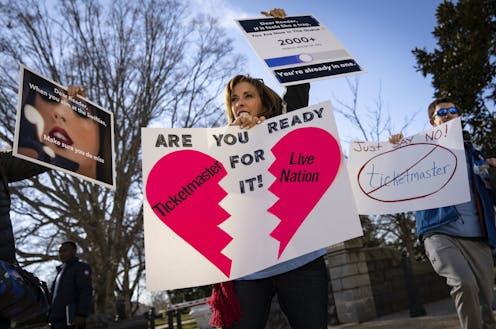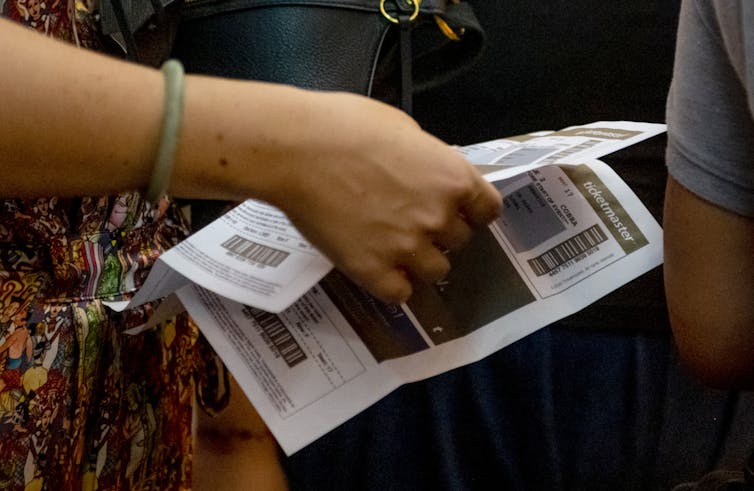
The U.S. Justice Department, along with 29 states and the District of Columbia, have filed an antitrust lawsuit against Live Nation Entertainment, the parent company of Ticketmaster.
The lawsuit alleges that Live Nation “engaged in a variety of tactics to eliminate competition and monopolize markets,” which, according to U.S. Attorney General Merrick Garland, has allowed the entertainment giant to “suffocate the competition” through its control of ticket prices, venues and concert promotion.
In response, Live Nation said that the antitrust suit “ignores everything that is actually responsible for higher ticket prices, from increasing production costs to artist popularity, to 24/7 online ticket scalping that reveals the public’s willingness to pay far more than primary tickets cost.”
The Conversation U.S. asked David Arditi, a University of Texas at Arlington sociologist and former professional drummer who has researched the livelihoods of musicians, to explain what’s behind the government’s decision to intervene in the ticket-selling business.
What is the government accusing the company of doing?
The government alleges that Live Nation Entertainment’s sprawling business model is choking off competition and that the company is punishing venues that rely on other ticketing services.
Live Nation, the country’s largest concert promoter, and Ticketmaster, the nation’s biggest ticket seller, had long been major players in the music industry. After the Justice Department approved a merger in 2010 between the two enterprises, the new company, Live Nation Entertainment, became far more powerful.
Live Nation Entertainment now controls many of the functions associated with putting on a concert: It owns venues, promotes concerts, books acts, produces shows, manages artists, sells tickets, and more.
Why is the Biden administration doing this?
After winning the 2020 presidential election, President Joe Biden promised to use the Justice Department’s antitrust division to break up monopolies, and that’s exactly what the government is trying to do with Live Nation Entertainment.
The government has been investigating Live Nation Entertainment for decades. But after a botched Ticketmaster presale for Taylor Swift’s Eras Tour in late 2022 – which made it nearly impossible for fans to buy tickets at face value – government scrutiny intensified.
After that fiasco, fans started contacting their lawmakers, and the U.S. Senate even held a hearing on the issue. In May 2024, the governor of Minnesota, Tim Walz, signed a bill into law that will require all ticket sellers in the state to disclose their fees up front.
How did Ticketmaster change the ticket-buying experience?
For much of the 20th century, buying tickets to a show or sporting event required traveling to the venue’s box office.
In 1976, Albert Leffler, who worked at Arizona State University’s performing arts center, and Peter Gadwa, an IT staffer on the same campus, founded Ticketmaster with businessman Gordon Gunn III. The enterprise began to sell tickets a year later. As the company developed, it incorporated new technology to facilitate ticket sales at a growing list of locations outside of the venue where a show would be performed.
Ticketmaster ultimately acquired Ticketron, its predecessor and rival.
As a teen in the 1990s, I remember waiting in line at a local grocery store in Williamsburg, Virginia, to buy tickets to a Dave Matthews Band show at the Virginia Beach Amphitheater. I had to be at the grocery store at 9 a.m. to purchase the tickets, but because it was a local Ticketmaster vendor, it saved me an hourlong trip to the venue.
A couple of years later, Ticketmaster introduced the technology required to give concertgoers the opportunity to purchase tickets online. In 2008, the company permitted paperless entry.
However, that convenience comes with hidden fees. Suddenly, the cost of your US$25 ticket can balloon to $40, with that extra $15 relatively opaque until checkout. These fees used to be a matter of convenience; there wasn’t a fee when you went to the venue to buy a ticket.
Now, the fees are unavoidable and multiplying: There can be a service fee, an order processing charge, a facility charge and a delivery fee.

How has Live Nation affected artists’ ability to make a living?
In my research and my personal experience, I’ve observed a sea change in the roles that live music and recorded music are playing.
From the 1970s to the 1990s, recording artists with medium-sized and large fan bases toured to promote their albums. During that time, these musicians assumed that they would take a loss on their tours; the payoff would come from their ability to sell more albums. Less prominent musicians, meanwhile, have always relied on playing at small venues to earn any income at all.
With the advent of file-sharing services, which later gave way to streaming, recording artists began to rely more on touring revenue to supplement their income, as money earned from album sales fell.
With even the most popular musicians increasingly relying on income from touring, they count more on making sure they earn what is owed to them. Fans feel like they have a close relationship with their favorite musicians and are willing to support them financially.
But when Live Nation Entertainment adds fees or pressures musicians to take a smaller cut of concert revenue, it becomes apparent to fans that they and their favorite musicians are getting a raw deal.
What will happen moving forward?
The government will seek a jury trial to determine if Live Nation Entertainment is a monopoly. If the company is found to be violating the Sherman Anti-Trust Act, Live Nation Entertainment would be forced to restructure, or even split into two or more separate companies.
Of course, lawsuits take time to resolve, even if the parties settle before entering a courtroom. And any potential ruling could have to go through an appeals process. I believe it’s likely that this dispute won’t be resolved for several years.
Aside from the lawsuit, the Biden administration is working on banning so-called “junk fees.” Eliminating exorbitant or hidden fees on concert tickets would address some of these problems.
Unfortunately, no matter what happens to Live Nation Entertainment, the music industry as a whole – whether it’s the record labels, streaming services, music publishers or music venues – is trending toward more consolidation and monopolistic behavior.
David Arditi does not work for, consult, own shares in or receive funding from any company or organization that would benefit from this article, and has disclosed no relevant affiliations beyond their academic appointment.
This article was originally published on The Conversation. Read the original article.







